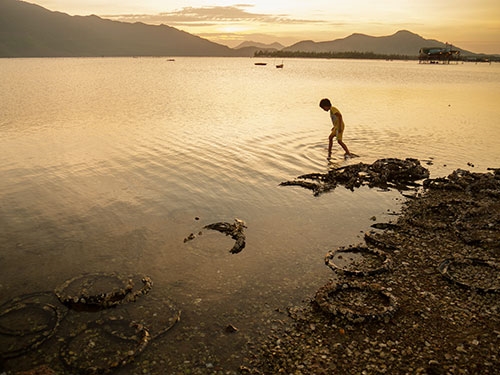 Environment
Environment

Oysters are raised in millions of recycled rubber tyres in Lăng Cô Town, Phú Lộc District, in the central Thừa Thiên-Huế Province, posing risks to water and consumer health, Tiền Phong (Vanguard) newspaper reported.
 |
| Oysters are raised in millions of recycled rubber tyres in Lăng Cô Town, Phú Lộc District, in the central Thừa Thiên-Huế Province, posing risks to water and consumer health. — Photo nld.com.vn |
THỪA THIÊN-HUẾ — Oysters are raised in millions of recycled rubber tyres in Lăng Cô Town, Phú Lộc District, in the central Thừa Thiên-Huế Province, posing risks to water and consumer health, Tiền Phong (Vanguard) newspaper reported.
Along Lập An Lagoon in Lăng Cô Bay, considered by many as one of the most beautiful bays in the world, wet and dirty rubber tyres are collected from various sources and piled up to be recycled into oyster raising cages.
Researchers from Huế University determined that rubber causes serious pollution to water sources once it is submerged in water for a long time.
A resident in the region named Hoàng Hùng said that the aquaculture productivity in the lagoon has reduced recently. The reason might be due to the rubber tyres.
Compared to traditional raising methods, 50 per cent of the oyster yield has been lost since rubber tyres started to be used, another local told Tiền Phong newspaper.
According to the People’s Committee of Lăng Cô Town, the town has nearly 250 households raising oysters in rubber tyres, with the total number of tyres reaching over 1,000.
Farmers used to use bamboo and wooden sticks as a traditional method of raising oysters. They came up with the new idea of using old rubber tyres from bicycles, motorbikes and cars about four years ago because it takes longer for rubber to erode or rot than wood.
In an effort to remove these potentially dangerous rubber materials, a project on raising oysters with environmentally-friendly methods was lauched in 2014 by Phú Lộc District authorities. However, the project simply forced all rubber products to move to the west of the lagoon rather than wipe them out.
Every day, the oysters are widely sold to markets in northern and southern provinces, which means consumers could fall victim to poisoning as a result of the rubber.
Trần Quang Tùng from Hà Nội University of Science and Technology said tyres soaked in water for a long time will disintegrate and form sulphur, black carbon and poisonous substances that pollute water and animals. Oysters raised in this environment also run a high risk of being exposed to the pollutants. These aforementioned substances are also banned in food production.
The symptoms of poisoning include headaches, dizziness and fatigue. If they accumulate in the body for a long time, they could lead to more serious consequences such as damage to eyesight, the digestive system and nerves, he added. — VNS




